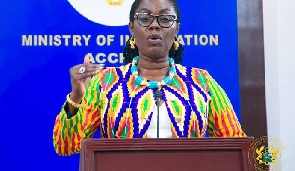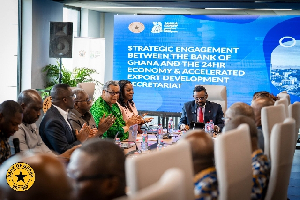The National Communications Officer of the Convention People's Party (CPP), Sylvester Sarpong, has bemoaned the move by the government to remove the daily limits to electronic money transfers that will attract the Electronic Transfer Levy (E-Levy).
According to him, the government, after convincing Ghanaians that the levy would not affect the poor because of the GH¢100 threshold, now wants to apply the tax on all mobile money transfers.
Sylvester Sarpong, popularly known as Soprano, asked the government and those who said the daily limit will prevent poor Ghanaians from being charged the E-Levy, including Ursula Owusu-Ekuful, whether every Ghanaian is now rich in a Neat FM interview monitored by GhanaWeb.
“We are asking them (the government) to bring the E-Levy rate to 0.5 (percent) so that Ghanaians can support it. We also want to ask whether we no longer have poor people in this country. I am talking to Queen Ursula of Dansoman.
“Honourable Queen Ursula of Dansoman previously stated that people who are able to spend GH¢100 in Ghana are not poor and that those who spend less are poor people. So, I’m asking Queen Ursula whether every Ghanaian is now rich for the government to remove the breathing space it gave on the E-Levy,” he said in Twi.
The Minister for Finance, Ken Ofori-Atta, announced a proposal to review the Electronic Transfer Levy (E-Levy) from its current rate of 1.5 per cent to 1.0 percent.
In addition to the reduction of the rate, Ofori-Atta also proposed the removal of limits on transfers that will attract the levy.
“Review the E-Levy Act and more specifically, reduce the headline rate from 1.5% to one percent (1%) of the transaction value as well as the removal of the daily threshold," he said.
Speaking on GH Today on GHOne TV, the Minister for Communication and Digitalisaion, Ursula Owusu-Ekuful, explained that anyone who has more than GH¢100 on them in a day for transactions should not be considered poor and should pay taxes on their digital transactions.
“We have made it a part of this policy that up to a GH¢100 a day per a person is exempt. This, the state is saying, if you’re sending up to a GH¢100 a day, cumulatively, you can send up to GH¢3000 a month, that is all going to be tax-free.
“Now, if you have more than a GH¢100 to send a day, then you’re not poor. So, if you really are poor and you are in a position to send GH¢100 a day, then we need to re-classify the definition of who the real beneficiaries of these are, and it is only the sender who pays, not the receiver,” she clarified.
Watch the interview plus Ursula's comments on the poor not being affected by E-Levy below:
Watch the second part of Elvis Afriyie Ankrah's interview on GhanaWeb TV below:
Also watch the nomination for the GhanaWeb Excellence Awards Youth Edition below:
IB/BOG
General News of Monday, 5 December 2022
Source: www.ghanaweb.com













